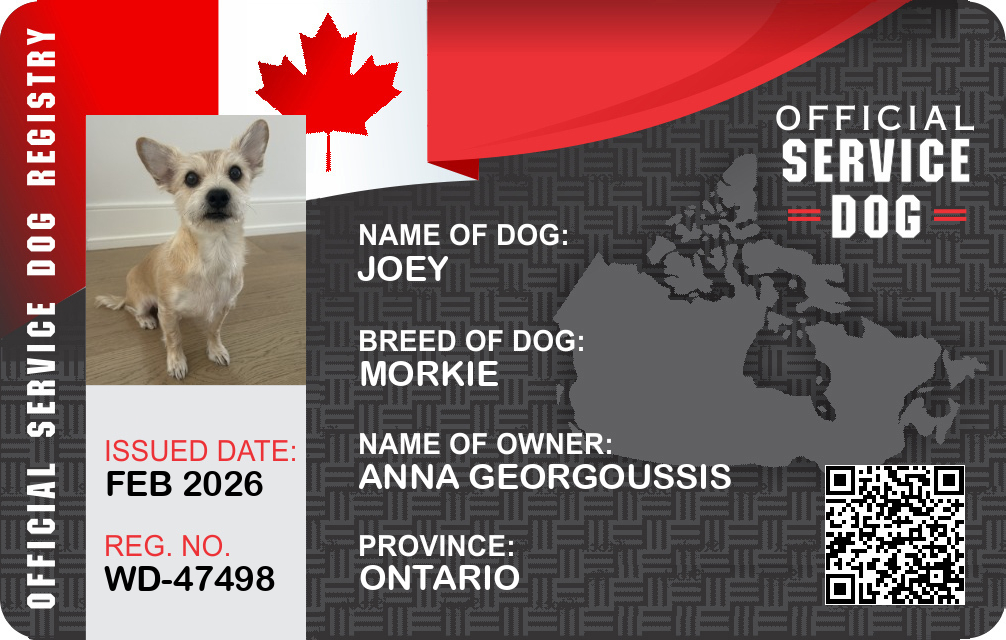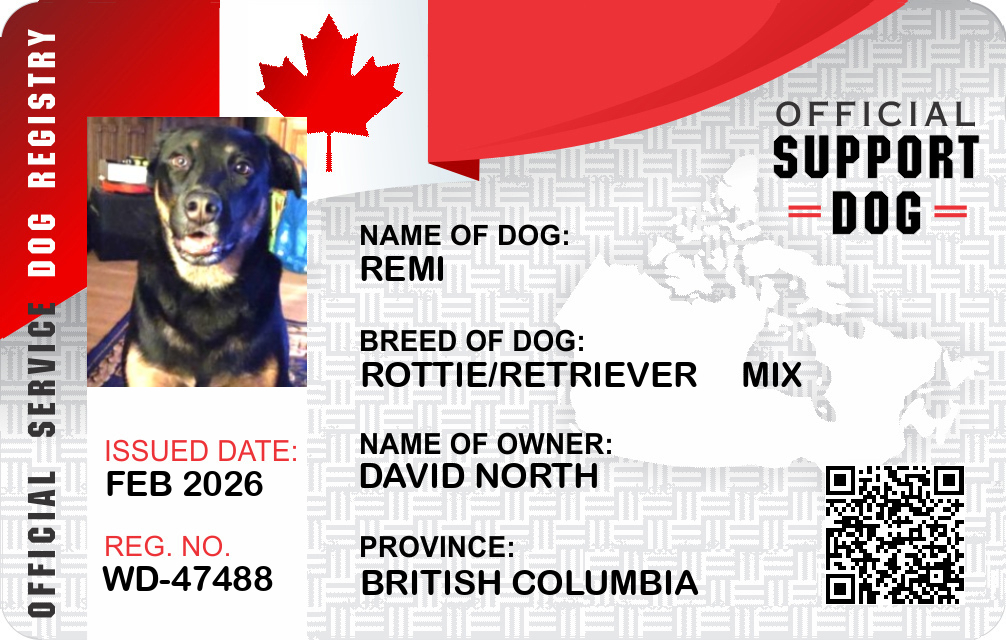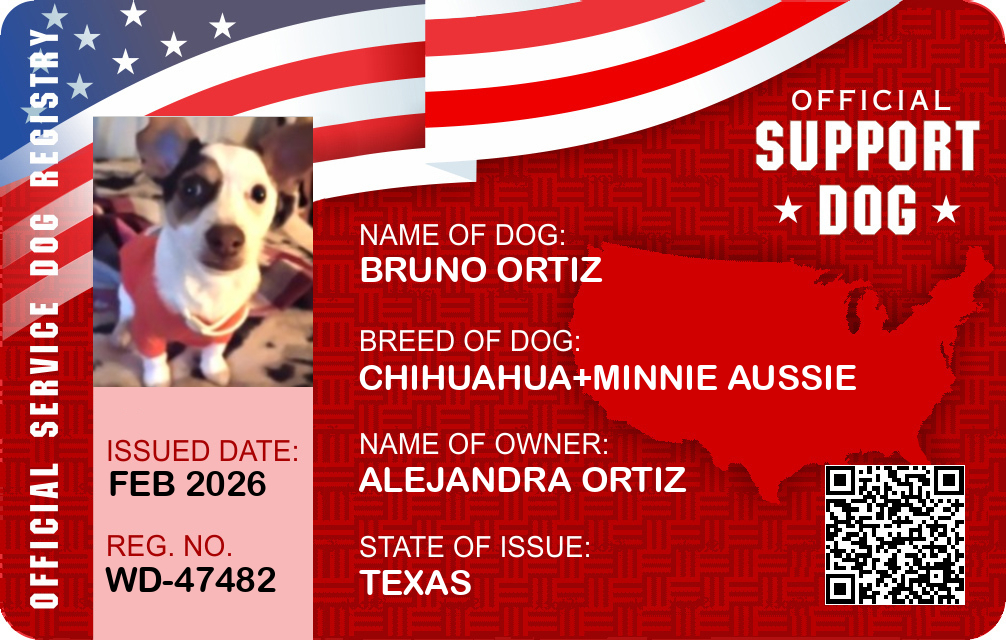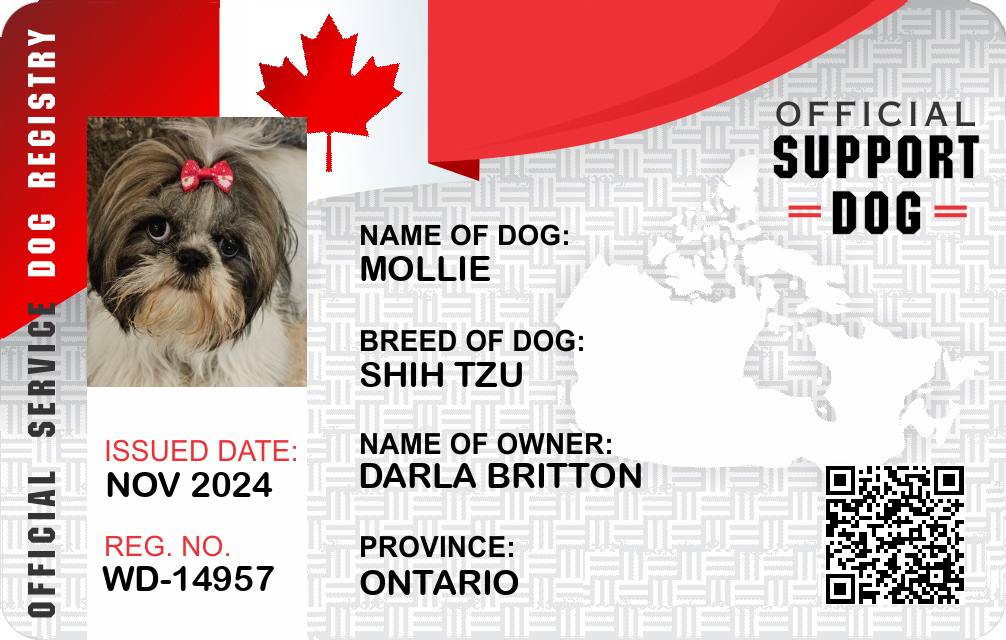Connecticut Service Dog Laws
Get Your Documents
Example State Cards


Overview of Service Dog and Legal Definitions in Connecticut
What is a Service Dog?
A service dog is defined under federal law, specifically the Americans with Disabilities Act (ADA), as a dog that is individually trained to perform tasks for a person with a disability. These tasks are directly related to the person’s disability, such as guiding individuals who are blind, alerting deaf individuals, pulling a wheelchair, reminding a person to take their medication, or any other duties that assist with a disability.
In Connecticut, service dogs fall under these same guidelines. The state aligns closely with federal definitions to ensure that there is clarity and protection for those who use service dogs as part of their disability management.
How Service Dogs Differ from Other Types of Assistance Animals
Service dogs differ from other types of assistance animals in several ways. Emotional support animals (ESA), for example, provide comfort through their presence but are not trained to perform specific tasks related to a disability. Therapy dogs visit hospitals or schools to comfort individuals but are not tied to one handler. Importantly, under the ADA, only service dogs are granted public access rights to accompany their handlers in most areas.
Connecticut recognizes the distinction between these types and grants specific rights and protections only to service dogs as defined by federal standards. Other assistance animals like ESA may be allowed in housing due to the Fair Housing Act (FHA) but do not have the same public access rights.
Key Federal Laws Affecting Service Dogs (e.g., ADA, FHA, ACAA)
Several key federal laws interact with Connecticut’s provisions on service dogs:
- ADA (Americans with Disabilities Act): Protects the right of people with disabilities to be accompanied by service dogs in most public spaces.
- FHA (Fair Housing Act): Requires landlords to make reasonable accommodations for individuals with disabilities, which includes allowing assistance animals such as service dogs and sometimes ESA.
- ACAA (Air Carrier Access Act): Governs the rights of individuals with service dogs during air travel, ensuring they can travel in the cabin with their handler.
These federal laws provide a comprehensive framework complementing Connecticut’s adherence to service dog regulations, ensuring protection across housing, public access, and transportation.
State-Specific Service Dog Laws in Connecticut
Housing Rights and Responsibilities
In Connecticut, the FHA is supported by state laws allowing individuals with disabilities to live with their service dogs in any housing situation. Landlords must accommodate legitimate service dogs even if the housing complex has a “no pets” policy. Exceptions only occur if the service dog poses a direct threat to the health or safety of others, or if it would cause substantial physical damage to the property.
Public Access and Accommodation
Connecticut adheres to the ADA in allowing service dogs to accompany their handlers in public places, including restaurants, theaters, stores, hotels, and more. Businesses cannot require documentation or fees for service dogs, nor can they deny access based on allergies or a fear of dogs.
Transportation and Travel Rules
Transportation entities in Connecticut, such as buses and trains, also follow ADA guidelines. Service dogs are allowed onboard public and private transportation without additional charges. Airlines operating in the state comply with the ACAA, permitting service dogs to fly in the passenger cabin without extra fees.
Employment and Workplace Considerations
Under the ADA, Connecticut employers are required to provide reasonable accommodations for employees with disabilities, which can include allowing a service dog in the workplace. Employers cannot discriminate against individuals because they need a service dog for their employment tasks.
Documentation, Requirements, and Processes in Connecticut
Service Dog Documentation and Who Can Issue It
Connecticut does not require “certification” or “registration” for service dogs. However, handlers may need to provide basic information about what tasks a service dog performs without disclosing specifics about the handler’s disability. While no formal paperwork is needed, handlers carrying a vest or ID card for the dog may face fewer challenges in public spaces.
Landlord, Business, and Provider Verification Rules
When verifying service dogs, businesses and landlords can ask two things: if the dog is required because of a disability and what work or task the dog has been trained to perform. They cannot require documentation or charge additional fees due to the presence of the service dog.
Rights, Limitations, and Legal Risks
Rights Service Dog Handlers Have in Connecticut
Service dog handlers in Connecticut have the right to be accompanied by their service dog in public places and transportation, and to receive reasonable accommodation in housing and employment. They can expect to access goods, services, and facilities without discrimination.
Limits on Service Dog Protections and Common Restrictions
While protections are robust, limitations exist in where service dogs are allowed. They can be excluded if they are out of control and the handler does not take effective action, if they are not housebroken, or if having them presents a fundamental alteration to the nature of business or service.
Penalties for Fraud or Misrepresentation
Fraudulently misrepresenting an untrained pet as a service dog is illegal. Connecticut follows federal guidelines where penalties can include fines or exclusion from certain facilities. This protects those with legitimate needs from fraud-related backlash that can occur in public spaces.
Practical Guidance for Service Dog Handlers in Connecticut
How to Qualify for a Service Dog Legitimately
To qualify for a service dog, individuals must have a disability as defined by the ADA and require the dog to perform specific tasks that mitigate the disability. It is crucial to work with a reputable trainer or organization recognized for training service dogs per ADA guidelines.
How to Talk to Landlords, Airlines, and Employers
Communication is key. Handlers should be prepared to politely educate landlords, airlines, and employers about their rights and the roles their service dog plays. It’s helpful to know the specific laws, present a calm demeanor, and, if comfortable, carry any additional information or cards from the training organization.
Summary of Service Dog Laws in Connecticut
Connecticut service dog laws provide robust protections that align closely with federal laws. Handlers have extensive rights in accessing public spaces, housing, and transportation, whereas limitations focus primarily on maintaining public safety and operational integrity. Documentation is minimally required, and handlers should be prepared for brief conversations with service providers regarding their dog’s role without needing extensive proof. Fraudulent claims of service animal status are taken seriously, with penalties in place to deter misuse of these rights.
Summary of Key Rights, Limitations, and Practical Tips:
- Service dogs must perform specific tasks to aid with a disability.
- Connecticut aligns with federal ADA rules for public access.
- No certification required, but basic explanations may be asked.
- Reasonable accommodation required in housing and employment.
- Misrepresentation of a service dog is illegal and punishable.
- Effective communication aids in navigating rights and responsibilities.
With this information, service dog handlers residing in or visiting Connecticut can ensure compliance and understanding, fostering positive interactions within their communities.
Get Your Documents
Example State Cards













